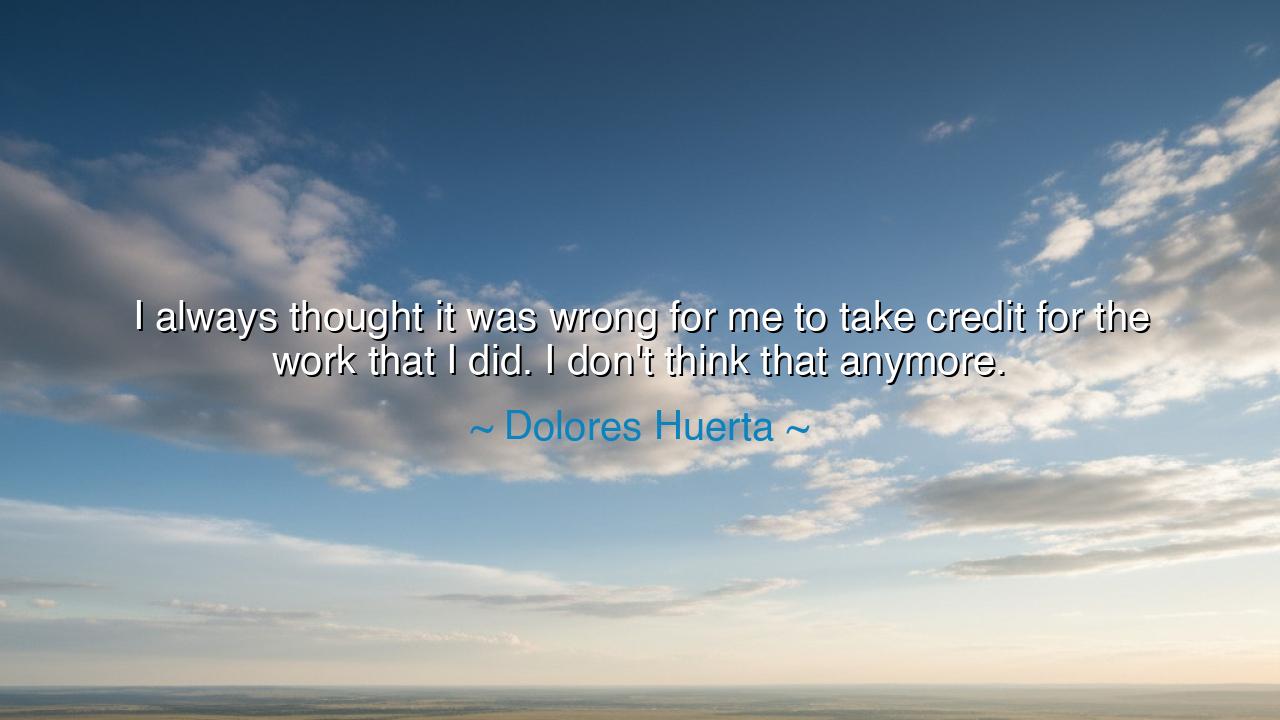
I always thought it was wrong for me to take credit for the work
I always thought it was wrong for me to take credit for the work that I did. I don't think that anymore.






Hear, O children of justice and endurance, the words of Dolores Huerta, who declared: “I always thought it was wrong for me to take credit for the work that I did. I don’t think that anymore.” In these words resounds the journey of a woman who long carried the weight of labor in silence, who believed humility required invisibility, and who later discovered that to claim the fruits of her labor was not vanity but truth. It is the voice of one who has labored for others, but who came to see that acknowledging her own contribution strengthens the cause she serves.
The meaning is powerful. Huerta reminds us that too often those who labor hardest—especially women, especially the unseen—believe they must step aside, that giving voice to their own achievements is prideful or selfish. Yet in silence, their power is diminished, and the world forgets the hands that built its victories. To take credit is not to boast, but to affirm one’s dignity, to show others—especially the young—that their own voices too must not be hidden. In her transformation, Huerta teaches us that recognizing one’s work is itself an act of justice.
The origin of her words lies in the fields and struggles of the farmworkers’ movement. As co-founder of the United Farm Workers alongside César Chávez, Huerta organized strikes, boycotts, and protests that gave dignity to laborers long neglected. Yet, for many years, the spotlight often shone on others. She, like countless women in history, was encouraged to believe that her role was secondary, her triumphs best left unnamed. But as time passed, she came to claim her place, to say: “I did this work, and my work matters.” This was not arrogance, but correction of an injustice, both personal and collective.
History gives us other examples. Think of Rosalind Franklin, whose research was pivotal in discovering the double helix of DNA, yet her credit was overshadowed by men who used her findings. Or of countless women in movements, wars, and revolutions, whose names were forgotten though their work sustained the cause. Huerta’s words rise as a beacon for them all: silence is not always humility—it can be erasure. And erasure robs the next generation of the courage to stand tall in their own contributions.
The lesson is luminous: to take credit for your work is not vanity but stewardship. If you deny your achievements, others may claim them, or the truth may be lost. When you speak your worth, you not only honor yourself but open the way for others to do the same. This is especially true for those who belong to the overlooked, the marginalized, and the silenced. To claim your voice is to resist erasure; to honor your labor is to strengthen the chain of progress.
Practical wisdom follows. If you labor in silence, learn to name your achievements—not to boast, but to witness. Write them down, speak them aloud, share them with those who come after you. If you see others’ work overlooked, give them the credit they deserve; do not let their efforts vanish into the shadows. Teach your children, your peers, and your community that recognition is not pride, but fuel for courage and persistence.
So let Dolores Huerta’s words echo across generations: “I don’t think that anymore.” For she has turned from silence to affirmation, from invisibility to recognition. And in that transformation lies strength—not only for herself, but for all who follow.
Thus, O seekers of justice, remember this truth: your work has worth, and your credit is its rightful crown. Claim it, honor it, and let no one erase it. For in doing so, you do not exalt yourself alone—you preserve the truth of history, and you light the path for those who will continue the struggle.






HGNguyen Thi Huong Giang
I love how this quote shows a shift in Dolores Huerta’s mindset. It’s as if she’s come to understand that taking credit isn’t about ego, but about acknowledging the value of her contributions. Could this shift be part of a larger movement toward self-empowerment, especially for activists and those working in fields that often go unrecognized? Does taking credit for your work also empower others to do the same and create a ripple effect of recognition?
Ccho
Dolores Huerta’s admission really resonates with the tension many people feel between humility and self-recognition. Could this idea apply to a broader cultural phenomenon where people feel uncomfortable asserting their accomplishments? I wonder how many people—especially in leadership roles—find it difficult to embrace their achievements. What would happen if more people, like Huerta, were encouraged to take pride in their contributions and celebrate their hard work openly?
Y842_khuc hai yen 8A
This quote feels like a realization about the importance of recognizing one’s own worth. For Dolores Huerta, it seems like a journey from modesty to understanding that her work deserves recognition. Why do you think some people struggle with taking credit for their own accomplishments? Is it due to societal expectations, or does it stem from a lack of confidence or fear of appearing boastful? How does this relate to the broader conversation about self-empowerment?
HDLe Hai Dang
Dolores Huerta’s shift in thinking about taking credit for her work is really powerful. It seems like a personal evolution from humility to recognition. I wonder how often people, especially women or those in marginalized communities, struggle with this same issue—feeling like it's wrong to claim their own achievements. What does this change in perspective say about the value of owning your success, especially when society often downplays your contributions?